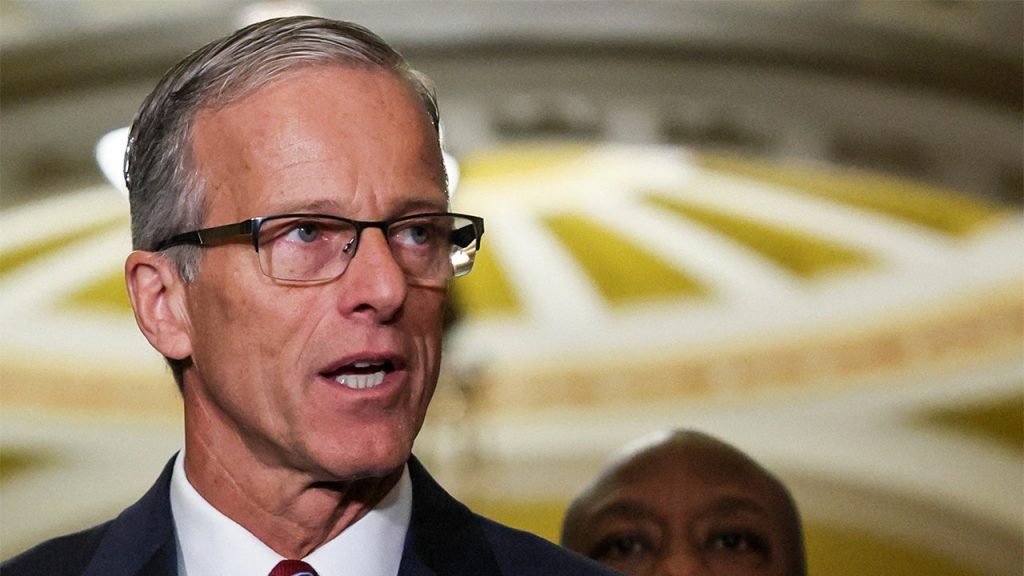The aftermath of the recent terrorist attack in New Orleans has ignited a firestorm of criticism directed at the FBI and other law enforcement agencies, with prominent Republican senators calling for sweeping reforms and accountability. Senator John Thune, the Majority Leader, expressed deep concerns about the erosion of public trust in the FBI, emphasizing the urgent need for a “makeover” and “housecleaning” to restore confidence in the institution. This sentiment resonates with the broader Republican critique of the FBI, which has faced accusations of bias and incompetence in recent years. Thune’s endorsement of Kash Patel, Trump’s nominee to lead the FBI, underscores the desire for a new direction and leadership within the agency. Patel’s perceived alignment with Trump’s agenda and his understanding of the FBI’s mission, according to Thune, position him as a potential agent of change.
The New Orleans attack, where a truck plowed into a crowd on Bourbon Street, has become a focal point of this criticism. Senator Bill Cassidy pointedly called for consequences for leadership failures within the New Orleans Police Department, particularly regarding the availability of security barriers that could have prevented the attack. The revelation that permanent barriers were being replaced at the time, while readily deployable temporary barriers remained unused, raised serious questions about preparedness and decision-making. Cassidy’s call for a “complete review” and potential replacement of Police Superintendent Anne Kirkpatrick reflects the demand for accountability at all levels of law enforcement. This incident highlights the broader concern about the effectiveness of security measures in public spaces, particularly in the face of evolving terrorist threats.
The initial characterization of the New Orleans attack by the FBI as not terror-related further fueled the criticism. The subsequent reversal and launch of a terrorism investigation, allegedly linked to ISIS, amplified concerns about the FBI’s competence and judgment. This incident aligns with a pattern of skepticism towards the FBI within certain political circles, particularly among Trump supporters. The perceived delay in acknowledging the terrorist nature of the attack has been interpreted as a sign of either incompetence or deliberate obfuscation. This incident underscores the delicate balance between cautious investigation and timely public communication, particularly in high-stakes situations involving national security.
The criticism leveled at the FBI extends beyond the New Orleans incident and reflects a broader dissatisfaction with the agency’s performance and perceived political bias. The FBI has been accused of mishandling investigations, exhibiting political favoritism, and failing to adequately address domestic terrorism threats. These concerns have been amplified by the highly charged political climate and the deep divisions within American society. The calls for reform and accountability signal a desire for increased transparency, improved performance, and a renewed focus on protecting national security.
The incoming Trump administration faces the challenge of addressing these concerns and restoring public trust in law enforcement. The nomination of Kash Patel to lead the FBI signifies a potential shift in direction and priorities. Patel’s background and perceived alignment with Trump’s agenda suggest a potential focus on internal reforms and a more aggressive approach to counterterrorism. However, Patel’s confirmation process is likely to be closely scrutinized, given the contentious nature of the FBI’s recent history and the political polarization surrounding law enforcement issues.
The New Orleans attack and the surrounding controversy highlight the critical importance of effective law enforcement in protecting national security. The calls for reform and accountability underscore the need for continuous improvement, transparency, and public trust. The incoming administration will face the daunting task of navigating these complex issues and ensuring that law enforcement agencies are adequately equipped and empowered to address the evolving threats facing the nation. The balance between national security and individual liberties will remain a central challenge in this ongoing debate.

